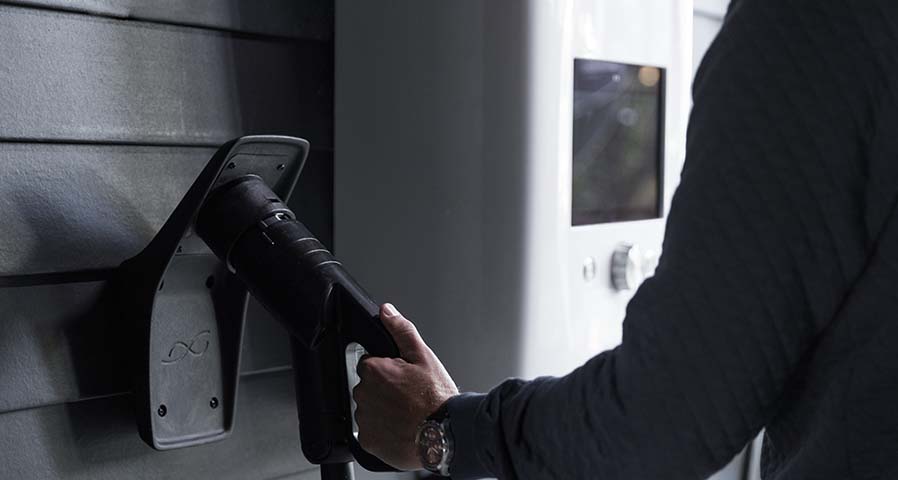Charging your electric vehicle at home is a convenience few drivers want to live without. You arrive home, plug your vehicle in, and enjoy relaxing inside. EVs come with a Level 1 trickle charger but the extremely slow charging time can be a major inconvenience. However, you can upgrade to a faster Level 2 home EV charger.
You can choose from several Level 2 EV charger models, each with different features. Level 2 chargers are compatible with all EV makes and models, except for Tesla. Tesla vehicles come with a special adapter that is only compatible with the brand’s chargers. However, you want to consider a few factors before installing a home charging station.
Charging Your EV at Home – What to Consider
Think About Where You Park
Do you park your EV in the garage or the driveway? Not all home EV chargers are weather-proof. Some outdoor EV chargers are not designed to handle severe weather. It’s best to research the various Level 2 home EV chargers to ensure you choose one that is rated for your climate.
It’s also a good idea to select a home charging station with a flexible cable, especially if you live in colder climates.
Our level 2 home charger offers you commercial grade charging speeds for a fraction of the costs. Our home EV chargers are waterproof, suitable for both indoor and outdoor use, with a minimalistic slim and compact design. Get yours today and ask about our installation services.
Where to Install the EV Charger
Along with choosing a flexible cable, you also want to pay attention to its length. The length of the cable varies with different types of EV chargers. Measure the distance from your parking space to the outlet. It lets you know the cable length needed to connect your vehicle. Most industry experts recommend choosing a home EV charger with a cable measuring at least 18 inches in length. You can also find cables up to 25 feet.
Match Your Home Charging Station to Your Lifestyle
Is your lifestyle better suited for a permanently mounted or portable EV charging station? EV owners that frequently travel may want to consider a portable charger over a mounted one. Here are the differences between the two types of chargers.
- Permanently mounted EV chargers are hard-wired into the electrical panel. These chargers are best suited for drivers that spend the majority of their downtime at home.
- Portable EV chargers are compatible with 240-volt outlets and hang conveniently out of the way on the wall. Don’t forget to check the plug. It’s either a NEMA 14-50P (it’s the same as most stove plugs) or a NEMA 6-50P (works with welder outlets). Homes without a 240-volt outlet can have one installed by an electrician. Just ensure the outlet matches the portable charger’s plug. Also remember that this type of charger needs to be charged itself and only offers a finite charge.
Which Home EV Charger is the Fastest?
When you upgrade from a Level 1 charger to a Level 2 unit, it typically means you are looking for a faster charging time. However, some variables can affect how quickly your battery charges.
- The battery size. Larger batteries take longer to charge.
- The maximum amount of power your home charger can output.
- Your EV’s power capacity
The environment also affects charging times. A hot or cold battery can limit the power intake.
The two variables that most affect charging times are the power source and the vehicle’s charger capacity. Level 2 chargers use a 240-volt outlet which increases the power, compared to Level 1 chargers using a 120-volt outlet. You can fully charge the battery in around nine hours with a 240-volt outlet, compared to the 24 hours it often takes with a 120-volt outlet.
EV charger capacity refers to the cable you plug into the EV. The cable converts AC electricity into DC power. An easy formula to use to determine the charging time is,
- Total charging time = kWh ÷ kW.
For example, if the EV has a 0-kW onboard charger and a 100-kWh battery, you can expect it to take 10 hours to charge a fully depleted battery.
Additional Considerations from Apogee Charging Solutions
You may also want to consider cable management. Chargers with a hook or holster keep the charging cable off of the floor when not in use. A locking mechanism is a convenient feature on outdoor home EV chargers. It prevents electricity theft and children from playing with the outlet.
One last consideration is who will install your new home charger? Apogee Charging Solutions offers a turn-key home EV charger solution. From purchasing the charger to having a local electrician install your charger we have you covered.
Ready to learn more about charging your EV at home? Contact us today to find out how we can help. Call 484-816-2076, email [email protected], or you can schedule a call that fits your needs by clicking the button below.








0 Comments